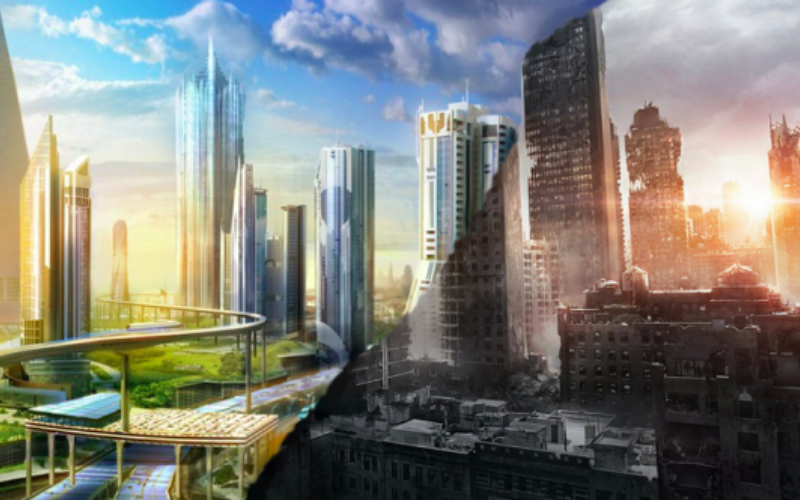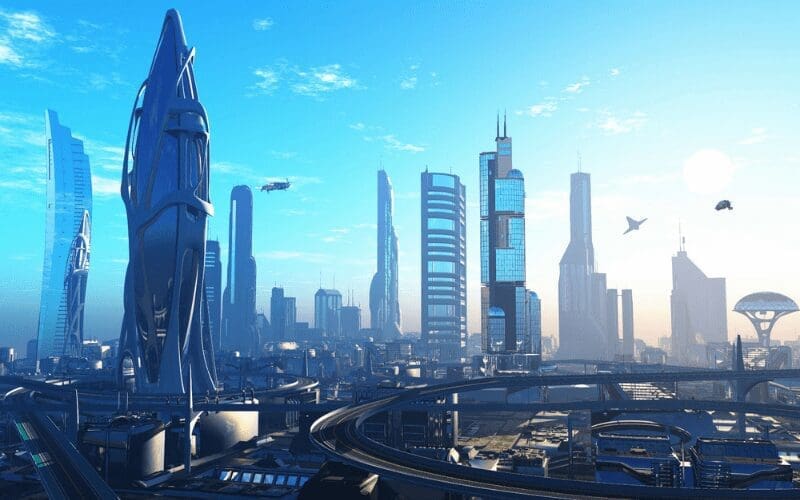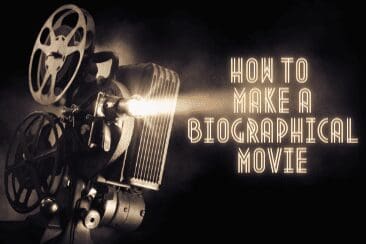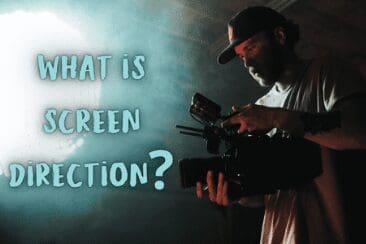
Dystopian fiction is arguably one of the most popular genres across film, music, literature, and it is easy to see why.
There is something inherently interesting about the worlds of ‘Black Mirror’, ‘I Am Legend’, ‘1984’ and ‘28 Days Later’. As well as countless other creations that imagine a world not too far from our own. With strange and often frightening differences, however.
In this article, we’re going to explore exactly what is dystopian fiction and also look at some utopia examples in fiction. Whilst also explaining how you can use it in your own story writing and filmmaking. Let’s jump straight in!
What Is Dystopian Fiction?

Before we get into the detail of the dystopian genre, let’s get some definitions out of the way.
The word dystopia derives from its more-positive counterpart ‘utopia’ – a term coined by Thomas More in the 1500s. It describes a place of perfection with peaceful governments. As well as things such as quality for citizens, a safe environment, access to education, healthcare and employment.
Additionally, it gives a general sense of happiness for all. Think of the Demolition Man’s 2032 vision of LA before Wesley Snipes showed up, or Avatar’s Pandora before the humans arrived.
Dystopian fiction, on the other hand, paints a world where things have gone wrong on a grand scale. The protagonists are living in a world shaped by the consequences of everything going awry.
Hallmarks of dystopian fiction include the following. A controlling or oppressive government, or perhaps no government at all. Extreme poverty or at least a significant gap between the wealthy and the poor. As well as heavy use of propaganda and the limitation of free speech. In many cases, there is also a battle with the conditions of the new world that has been invented.
Famous Dystopian Fiction In Films
Now the two most famous pieces of literature that people have probably heard of are ‘Brave New World’ by Aldous Huxley and ‘1984’ by George Orwell. It will become more clear in this short video what they are about.
What Is Utopian Fiction?

Utopian fiction is much less common in modern storytelling and film. It’s often related to religious texts, particularly from the middle ages.
In fact, the term was actually coined in Thomas More’s 1516 book, ‘Libellus vere aureus, nec minus salutaris quam festivus, de optimo rei publicae statu deque nova insula Utopia’.
In English, this means: “A little, true book, not less beneficial than enjoyable, about how things should be in a state and about the new island Utopia”. Outlining what the perfect society would look like.
Of course, the Utopia of the 1500s wouldn’t really constitute a perfect world by today’s standards. More’s vision included slavery, pre-defined gender roles, and religious diversity.
However, it also included a dislike of atheism, and the punishment of enforced celibacy for anyone engaging in pre-marital sex. The earliest examples of dystopia were artistic responses to utopian texts.
Perhaps it’s what makes us human, but a story without any tension is typically not very compelling. So modern utopian fiction is really more of a toolset used within the dystopian fiction genre.
Examples Of Utopian Fiction

Take the 1998 movie classic, ‘The Truman Show’ for example. Truman Burbank finds himself questioning his whole world. Which is presented very much as a perfect place where he has everything he needs. Culminating in his decision to follow his heart into the unknown. Rather than remain in the perfect prison, the show’s creator Christof has created for him.
Finally, the presentation of a utopia can be used as a device to highlight the corruption of a perfect system. If we take Pixar’s ‘Wall-E’ for example, the dystopian vision of Earth as a dumpster planet is contrasted with the utopian vision of the space station cruise ship as a utopia.
However, what was once thought of as a utopia ends up representing a compromise forced upon humanity. This is because they have not properly looked after the planet, and have ultimately lost sight of what it means to be human. The only resolution is to go back to Earth and start again by looking after nature.
Why Is Dystopian Fiction So Popular?

Now we have a dystopian fiction definition, let’s look at why it’s so popular.
The wonderful thing about dystopian fiction, is that it allows the creator to explore themes and concepts that are based on events that happen today.
If you’ve seen Christopher Nolan’s epic Sci-Fi adventure movie ‘Interstellar’, you’ll have noticed the very prominent themes around conservation. As well as the potential conclusions facing humanity if we don’t act swiftly to prevent climate change.
Outside of politics, creators can use dystopia to pose ethical questions. Charlie Brooker’s Black Mirror series is a collection of individual stories set in a dystopian near-future. Where technology has advanced enough to have an impact on how humans live and work. As well as the kinds of moral dilemmas new technology poses.
How To Write Dystopian Fiction

Have we inspired you yet?
In this section, we’re going to go over how to write dystopian fiction.
Let’s get started!
Define Your Key Concept
The key component of dystopian fiction is to define the key concept. This is not necessarily your story, but rather the key thought you are exploring.
In George Orwell’s short novel, ‘Animal Farm’, the key concept is really the problem of corruption within communism. Which ultimately ends up undermining the whole system. The pigs are dissatisfied with how the farmer is running the farm, so they stage a coup and take control.
However, as their power grows they lose sight of their original motivations and their complaints about the farmer. They end up walking on two legs, sleeping in beds, wearing clothes, and ultimately treating the other animals on the farm just as badly as the farmer had done. Which in turn, allows Orwell to draw a parallel between the beautiful vision of communism, but the hard reality once the system is corrupted by greed.
Find Your Trigger Point
Beyond the key concept, you also have the question of the trigger point. This is the nucleus for what has led to the status quo of your new universe being strange and unfamiliar to the reader.
This can be something based on today’s political, cultural and social issues. Such as climate change in the case of films such as ‘Wall-E’, ‘Avatar’ and ‘Interstellar’.
The trigger point could also be something a little more far-fetched. Such as a zombie apocalypse as is the case in films like ‘Zombieland’ or ’28 Days Later’.
However your universe has come to be, the important thing is how your characters then interact with the conditions and constraints of the world around them.
In ’28 Days Later’, Danny Boyle explores themes of love, sacrifice, loss, and hope by having his main character, Jim, wake up from surgery having been unconscious as humans infected with a rageful disease ripped through the country.
The opening scenes of the movie are incredibly powerful. Cillian Murphy wanders aimlessly through a deserted London, collecting piles of cash and calling for help before he finally encounters one of the monsters first hand.
Pay Attention To Detail
When it comes to writing dystopian fiction, detail and nuance are the keys to making your new world interesting and engaging.
One of the best examples of this is The Wachowski’s ‘The Matrix’ trilogy. The dystopia is incredibly detailed and totally enthralling – ‘If real is what you can feel, smell, taste and see, then ‘real’ is simply electrical signals interpreted by your brain’.
In ‘The Matrix’, the Wachowskis go even further and explore everyday events that we are all familiar with. Such as having a sinister foundation with something as simple as déjà vu.
Not to mention, that the very fabric of the new world they have created serves to underpin a believability to some of the most creative and outlandish fight scenes imagined, as characters sprint up vertical walls and leap across buildings.
Stick Within The Rules
The point about nuance and detail also leads to another cornerstone of creating dystopia. It is of utmost importance to stay within the rules of the universe you have created. This includes the motivations your characters experience.
For example, in ‘Back to the Future II’, Marty travels to an alternative future where Biff has become the all-powerful mayor of Hill Valley. Biff has been able to do this because he stole a sports almanac in 2015, and used Doc Emmet Brown’s Delorean time machine to travel back to 1955 and give it to his younger self.
In the dystopian future, Marty’s mother, Lorraine, is married to Biff despite the fact that she hates him. However, her motivation is explained within the confines of the dystopia. She was essentially forced to marry Biff because Biff would have imprisoned or harmed her children. Who of which is her top priority, and so the motivation is believable.
Conversely, in M. Night Shyamalan’s movie ‘Signs’ – an alien race invades the earth and begins taking control. That is until it is discovered that water is toxic to the aliens and kills them on contact.
Obviously, this plot twist undermines the whole dystopia. Wouldn’t an alien race with the ability to travel millions of lightyears, have the foresight to make sure they weren’t landing on a planet 2/3 covered with a substance that kills them? Did they not try to invade any towns whilst it was raining? Did none of the aliens accidentally run through a sprinkler?
Dystopia Fiction Name Generator
Have you heard of this genius little generator? If you have ever wanted to know if a dystopian world name generator exists, then it sure does.
The Dystopia Name Generator is a tool that generates names for fictional dystopian worlds or societies. It works by combining different words or phrases related to dystopian themes, such as oppression, rebellion, and technology, to create unique and evocative names. Users can input their own words or choose from pre-selected options to customize the generator’s output. You can find out more using this link.
Now You Know All About Dystopian Fiction

Hopefully, this article has given a little more insight into the dystopian genre!
We’ve answered the question ‘what does dystopian fiction mean?’ and covered lots of great examples of the dystopian genre. As well as the main features of the genre and how to go about building your own dystopian universe.
Now, all that’s left is to take the red pill and go and invent an alternative reality! Good luck!
If you’re a movie fan then you have come to the right place. Here at Мusic Gateway, we have plenty of interesting articles for you to read. Why not check out the Best Comedy Movies Of All Time: Our Top 10 Favourites, Famous Movie Scenes, or Famous Filmmakers?









